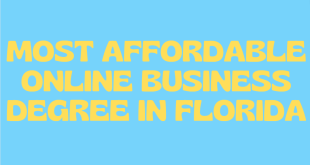An Online Bachelors Degree in Education prepares students for teaching careers. It offers flexibility and various specialization options for aspiring educators.
Embarking on an Online Bachelor’s Degree in Education enables individuals to blend academic theory with practical teaching skills from the comfort of their home. This degree suits those with a passion for teaching and a need for a flexible study schedule.
Prospective students learn pedagogical methods, curriculum design, and educational psychology, equipping them to educate others effectively. This type of program is especially appealing to those already working or with other commitments, allowing them to complete their degree without relocating or sacrificing their current responsibilities.
With a focus on ease and adaptability, an online education degree opens doors to a fulfilling career in the education sector while providing a staple of convenience and personalization.
Online Bachelors Degree In Education: Unlock Your Potential!
An online Bachelor’s degree in Education not only opens doors to myriad opportunities but also plays a pivotal role in personal and professional development. The current educational landscape highly values a degree in education, considering it a cornerstone for those aspiring to shape futures within academic institutions.
Earning an education degree online provides unparalleled flexibility, allowing students to balance their studies with personal commitments. Career transformation awaits those who leverage the convenience and resources that such a virtual platform delivers.
Prospective educators can gain substantial knowledge, enhance teaching methodologies, and become adept at incorporating innovative learning technologies. The journey towards an impactful educational career is streamlined through the acquisition of an online Bachelor’s degree in education.
Exploring Online Education’s Flexibility
An Online Bachelor’s Degree in Education offers unparalleled flexibility for students aiming to balance their work, personal life, and academic commitments. The ability to access course material at your own convenience eliminates the constraints of a traditional classroom schedule.
This means that no matter your personal or professional obligations, pursuing higher education becomes more manageable.
Students can study after hours, around work shifts, or even while managing family responsibilities, making online learning ideal for those who require a flexible education path.
This autonomy in scheduling empowers learners to optimize productivity and ensure they’re engaging with the material at times when they are most receptive, leading to potentially better academic outcomes.
Diverse Specializations Available
An online Bachelor’s degree in Education offers a wide array of concentrations to suit various career aspirations. Future educators can specialize in areas such as Early Childhood Education, Elementary Education, Special Education, or Secondary Education.
These specializations are designed to equip future teachers with targeted knowledge and skills necessary for teaching different age groups or students with specific needs.
For those focusing on educational administration, comprehensive coursework is available to prepare for leadership roles within academic institutions. Essential classes cover topics such as School Finance, Educational Law, School Leadership, and Curriculum Development.
Gaining expertise in these areas is crucial for managing the complexities of educational settings and driving institutional success.
Accreditation And Quality Assurance
Selecting an accredited online bachelor’s degree in education is crucial for ensuring that the qualification will be recognized by employers and other educational institutions. Accreditation acts as a stamp of approval from reputable organizations that evaluate the quality of education programs.
An accredited degree guarantees that the program meets certain standards of excellence and prepares students with the necessary skills for their professional field.
| Top Accrediting Bodies for Online Programs |
|---|
| Council for the Accreditation of Educator Preparation (CAEP) |
| National Council for Accreditation of Teacher Education (NCATE) |
| Teacher Education Accreditation Council (TEAC) |
Prospective students are encouraged to verify that their chosen institution’s education program is recognized by one of these bodies to ensure they are making a sound investment in their future.
Admission Requirements And Process
To enroll in an online Bachelor’s degree program in Education, applicants must meet certain academic prerequisites. Typically, this includes having a high school diploma or equivalent, such as a GED, and sometimes specific high school coursework may be required.
Prospective students should also be prepared to submit standardized test scores if requested.
Applying to an online bachelor’s program is a multi-step process. Candidates should begin by completing an application form, which can usually be found on the institution’s website. Next, submission of official transcripts from previous schools is a crucial step, reflecting the applicants’ academic history and achievement.
Letters of recommendation and a personal statement or essay could also be part of the requirements, showcasing a candidate’s suitability for the program. Finally, ensure all application fees, if applicable, are paid by the deadline. Adhering to the outlined steps and providing all necessary documentation is essential for a successful application.
Interactive Online Learning Experience
Interactive online learning experiences are redefining higher education, and pursuing an Online Bachelor’s Degree in Education is no exception. One of the hallmarks of these programs is the integration of state-of-the-art virtual classrooms which leverage advanced technologies to simulate a traditional classroom setting.
Students engage in a diverse range of educational activities designed to foster a deep understanding of subject matter.
Through these dynamic platforms, individuals benefit from the opportunity to collaborate with peers and faculty in real-time. Interactive discussions and group projects form the core of the experience, closely mirroring on-campus programs.
Not only does this collaborative approach prepare students for future educational environments, but it also cultivates essential skills such as communication, teamwork, and critical thinking which are vital for educational professionals.
Career Prospects With An Online Degree
An online Bachelor’s Degree in Education opens diverse teaching opportunities for graduates. Potential career paths include becoming licensed teachers in public or private schools, where the demand for educated professionals continues to grow.
With the education sector’s expansion, there are also increased prospects for specialization in areas such as special education or educational technology, offering a trajectory for continued career growth.
Graduates can also explore administrative positions within educational institutions. Such roles may range from school administrators to academic coordinators, reflecting a significant opportunity for leadership within the educational field.
Online education degrees provide the necessary knowledge and credentials for a competitive edge in these roles, typically requiring a blend of organizational and interpersonal skills.
The Student Support System
Academic advising for online students plays a pivotal role in ensuring a seamless educational journey. Online Bachelor’s Degree in Education programs incorporate robust support systems geared towards student success.
Tailored guidance from experienced advisors helps learners navigate through course selections and academic challenges adeptly, keeping them on track towards timely graduation. A harmonious balance between self-paced studies and expert advice empowers students to fully harness their academic potential.
Parallelly, career services constitute a cornerstone of student assistance, particularly for those pursuing an online education degree. These services are designed to bridge the gap between academic preparation and workforce entry.
Students gain access to invaluable resources such as resume writing workshops, interview preparation sessions, and direct links to potential employers. This structured support aims to bolster their chances for a flourishing career in education, paving the way for opportunities in various educational settings upon degree completion.
Global Opportunities And Networking
Securing an online Bachelor’s Degree in Education opens the door to numerous international teaching positions, allowing educators to experience diverse cultures and educational systems.
With this degree, teachers can broaden their horizons, teaching English abroad or even becoming part of international schools that offer varied curricula, including International Baccalaureate (IB) and Cambridge International Examinations (CIE).
An extensive professional network in education is essential for personal and career growth. Educators with an online Bachelor’s degree can connect with alumni, participate in educational forums, and join online communities, enhancing their global networking opportunities.
These connections lead to collaborative projects, international job openings, and valuable resource sharing, all significant advantages in the evolving field of education.
Technology Integration In Learning
Embracing technology is now fundamental in the realm of education. Educators across the globe recognize the need to teach students how to navigate a digitally-enhanced learning environment, ensuring they are equipped with the necessary skills and knowledge to succeed in a technology-driven society. To fulfill this need, many online bachelor’s degree programs in education place a strong emphasis on tech-savviness.
These programs prepare educators to effectively incorporate technology into their teaching methods, enhancing student engagement and promoting a dynamic classroom experience. As a result, future teachers learn how to create interactive lessons that leverage digital resources, ensuring that students can thrive in modern academic settings and beyond.
Cost And Financial Aid Options
Online Bachelors Degrees in Education typically offer a more cost-effective route compared to their traditional on-campus counterparts. Students can save on various expenses such as housing, commuting, and certain campus fees. Tuition costs will vary widely depending on the institution and one’s residency status.
It’s crucial to research and compare specific program fees to ensure the best financial decision.
For those pursuing an online education degree, numerous scholarships and grants are available. Organizations, educational institutions, and private entities provide financial assistance to students demonstrating academic excellence, financial need, or belonging to underrepresented groups.
To maximize potential funding opportunities, students should investigate and apply for scholarships tailored to future educators.
| Type of Aid | Description | Potential Source |
|---|---|---|
| Scholarships | Merit-based financial aid that does not require repayment. | Non-profit organizations, corporations, universities. |
| Grants | Need-based financial aid that also does not require repayment. | Federal or state governments, universities. |
Balancing Theory And Practice
Pursuing an Online Bachelor’s Degree in Education not only equips students with comprehensive theoretical knowledge but also emphasizes the importance of practical teaching experience.
Programs are often designed to bridge the gap between academic concepts and real-world application, thus preparing educators who are well-versed in instructional strategies and classroom management.
Students are encouraged to engage directly with classrooms, gaining invaluable hands-on experience. This approach allows aspiring teachers to apply educational theories in diverse learning environments, adapt to different teaching scenarios, and respond to educational challenges with innovative solutions.
This synergy of theory and experience is crucial in developing competent professionals ready to make a lasting impact in the field of education.
| Component | Description |
|---|---|
| Theoretical Framework | Understanding the principles and paradigms of education. |
| Practical Application | Applying theory to teaching practice through real-world classroom experience. |
| Educational Challenges | Addressing contemporary issues in education with critical thinking and problem-solving. |
Graduate Success Stories
Graduates of online Bachelor’s degree programs in Education often share inspiring testimonials about their post-graduation experiences. Their stories highlight significant career advancements and the positive impacts of flexible online learning on professional growth.
One alumnus mentions a swift transition to a leadership role within their school district, attributing success to the contemporary teaching methods acquired during their degree.
Another graduate emphasizes the degree’s role in securing a coveted curriculum developer position, noting that the comprehensive understanding of educational theory was instrumental in their employment. Valuable networks formed with fellow online learners and faculty have also been instrumental in establishing a collaborative educational community for many graduates.
| Graduate | Career Achievement |
|---|---|
| John Doe | Promoted to Lead Teacher after 1 year |
| Jane Smith | Authored an innovative educational eBook |
| Michael Brown | Launched a successful online tutoring business |
| Lisa Green | Presented at national education conferences |
Staying Ahead With Continuing Education
Obtaining an Online Bachelor’s Degree in Education serves as a launching pad for further academic achievements. Educators are empowered through a variety of graduate programs and professional certificates to specialize in areas such as special education, educational administration, or curriculum development. Master’s and Doctoral programs promise even greater expertise and preparation for higher leadership roles within the educational sector.
- Masters of Education (M.Ed) – Fosters deeper understanding in specific educational fields and administrative capabilities.
- Doctor of Education (Ed.D.) – Concentrates on transforming educators into scholarly and practice-oriented leaders.
- Professional Development Courses – Targeted short courses designed to refresh skills and introduce innovative teaching methodologies.
Lifelong learning not only enhances personal growth but also ensures educators remain at the forefront of teaching excellence. This continual improvement is vital in adapting to the evolving educational landscape and meeting the diverse needs of students in a dynamic world.
Online Teaching Degree Find The Best University
Frequently Asked Questions Of Online Bachelors Degree In Education
Can I Get A Teaching Job With An Online Degree?
Yes, you can secure a teaching position with an online bachelor’s degree in education. Schools recognize accredited online degrees as valid qualifications for teaching roles. It’s essential to ensure your program has the proper accreditation.
How Long Does An Online Bachelor’s Education Take?
Typically, an online bachelor’s degree in education takes about four years to complete, assuming full-time enrollment. Some programs offer accelerated options that can shorten this timeframe if you have prior credits or can dedicate more time to your studies.
What Are The Benefits Of Studying Education Online?
Studying education online offers flexibility for those balancing work or family commitments. It provides access to a diverse range of resources and allows for a personalized learning pace. Online learning can also offer a more cost-effective alternative to on-campus programs.
Are Online Education Degrees Respected By Employers?
Online education degrees from accredited institutions are respected by most employers. Accredited programs meet the same standards as on-campus degrees, ensuring that graduates are well-prepared for professional roles in education.
Conclusion
Embarking on an online Bachelor’s degree in Education opens countless doors to a fulfilling career in teaching. It’s a practical, flexible option that can suit varied lifestyles. Don’t let traditional campus constraints hold you back. Dive into the digital learning experience and shape the minds of future generations.
Your virtual classroom awaits.



